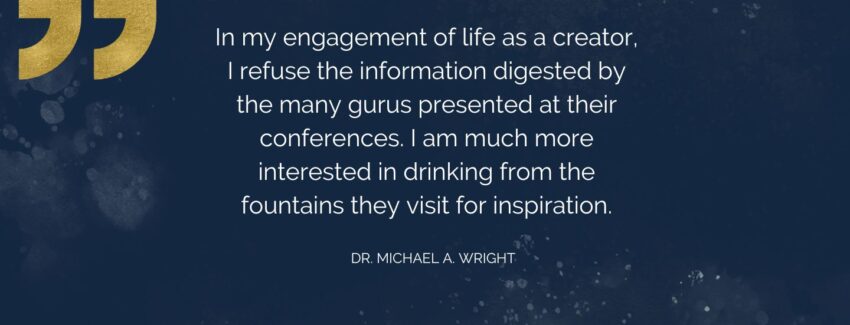Someone asked me if I had ever attended seminars or sat with gurus and thought leaders like Tony Robbins or John Maxwell. I had to think about it a moment because I never considered the question. After a moment I realized my bias. I am hyper-fixated on ensuring that I am never a consumer. In my engagement of life as a creator, I refuse the information digested by the many gurus presented at their conferences. I am much more interested in drinking from the fountains they visit for inspiration. I have done the deep dives into historical, social, political, and religious texts to find the origins of what we now call popular psychology, self-help, inspirational publishing, and motivational speaking. I'll give you 3 of my favorites.
In 1910, Wallace Wattles wrote "The Science of Getting Rich." Diving deep into Wattles' philosophy, I discovered the profound simplicity with which he presented the principles of success. But it was the operation of the text, the way he conveyed the instructions, which had me conjure my own version of these teachings—a method I aptly titled "the certain way." The idea was first coined in the book by Wattles, yet he never laid out a clear, step-by-step guide for achieving this certain way and that's what I crystallized in my work. Through distilling his concepts, I developed a more structured approach to tapping into the rich potential he so eloquently described.
Moving on to 1933, we find "The Mis-Education of the Negro" by Carter G. Woodson. Now, Woodson is not just a name we remember during Black History Month; he is a monumental figure whose scholarship provides critical insight into the plight and potential of the Black educated individual in America. His rigorous study served as a beacon for understanding not only the social structures of the time but also the individual identity development within the Black community. Reflecting on the works of Booker T. Washington and his ideological debates with W.E.B. Du Bois, one cannot overlook Woodson's contribution. His analysis presents the most contemporary explanation of the dynamics at play, offering an indispensable perspective even before one consults more modern writers like Ta-Nehisi Coates or Ibram X. Kendi.
Lastly, the final text I would recommend is "Anatomy of Prejudices." The influence this book had on my intellectual journey is monumental. It broke down the intersections of culture, perception, psychology, and social polity in such a way that it became clear how an understanding of these elements could empower one to shape the world. The author proposed that the capabilities of transformation and structural creation are inherent within us as humans. This groundbreaking perspective opened a door for me to explore fields such as sociocybernetics, complex adaptive systems, and agent-based modeling with a profound appreciation of how human thinking and biases form the bedrock of social constructs.
It's fascinating to see how the ideas of these three authors have permeated through time, taking on new forms and interpretations. They've been built upon, copied, and amplified in multiple contexts and with varied import and intention. And there's no shortage of examples: Rhonda Byrne's 2006 film and 2007 book "The Secret" was directly inspired by "The Science of Getting Rich." Byrne herself acknowledged Wattles' book as the seed from which her global phenomenon grew. She managed to take "the certain way" and translate it into a universal message about the Law of Attraction that resonated with millions.
Such is the power of these seminal works; they spark ideas and movements well beyond their original scope, influencing generations of thinkers and doers, myself included. Whether it is in the form of personal success, societal understanding, or the underpinnings of prejudices, the insights they provide continue to be relevant and groundbreaking.
Count me among the celebratory throng—a group uplifted and enlightened by the profound wisdom of these thought leaders. From Wallace Wattles, who offered the blueprint for prosperity, to Carter G. Woodson, who illuminated the complexities of cultural education and self-identity, to the author of "Anatomy of Prejudices," who provided the tools for dissecting and comprehending the undercurrents of our social interactions. Each, in their unique way, has contributed to the foundational narrative of human progress.
References:
- Wattles, Wallace D. "The Science of Getting Rich". 1910.
- Woodson, Carter G. "The Mis-Education of the Negro". 1933.
- Young-Bruehl, Elizabeth "Anatomy of Prejudices". 1996.

